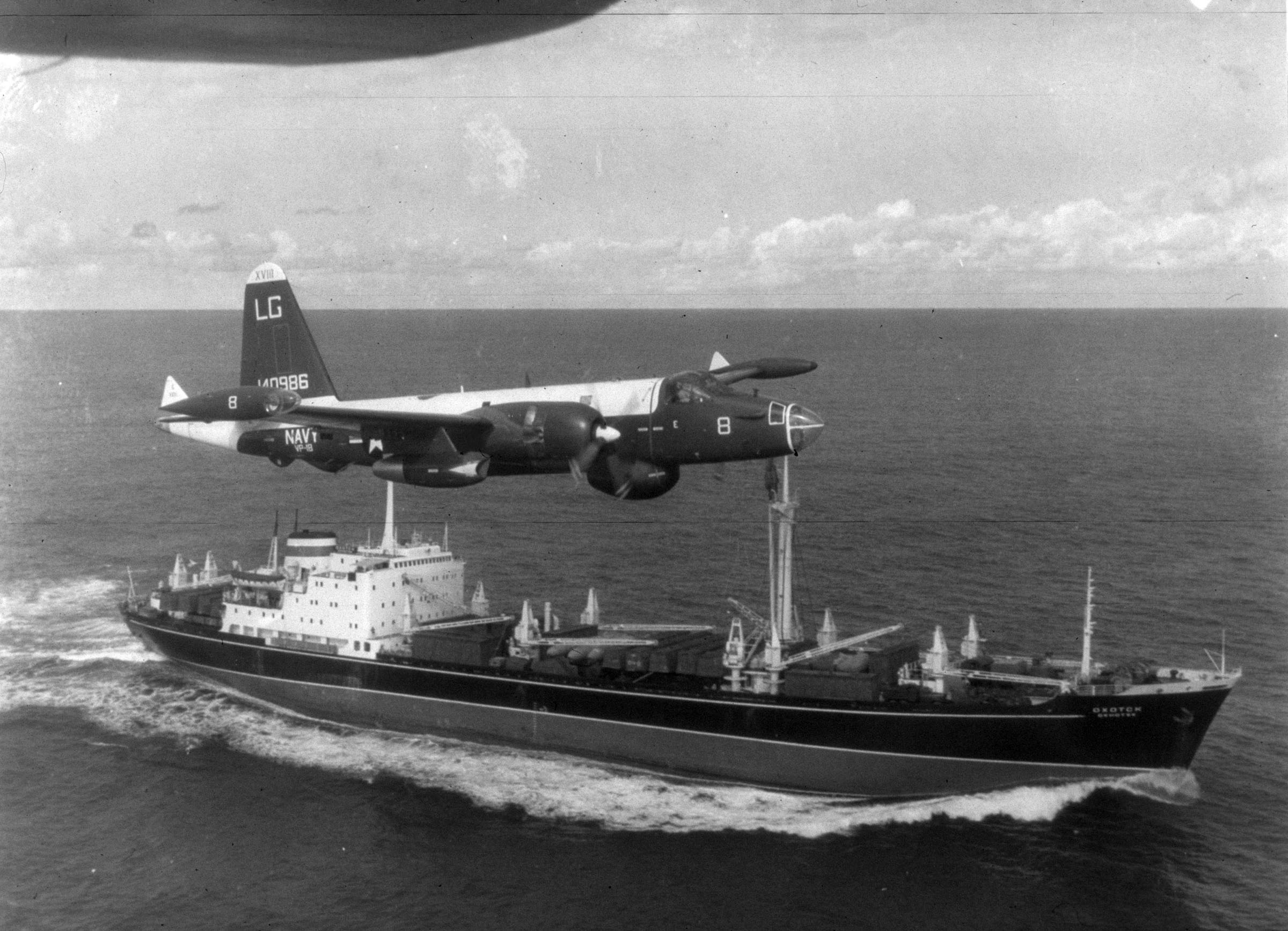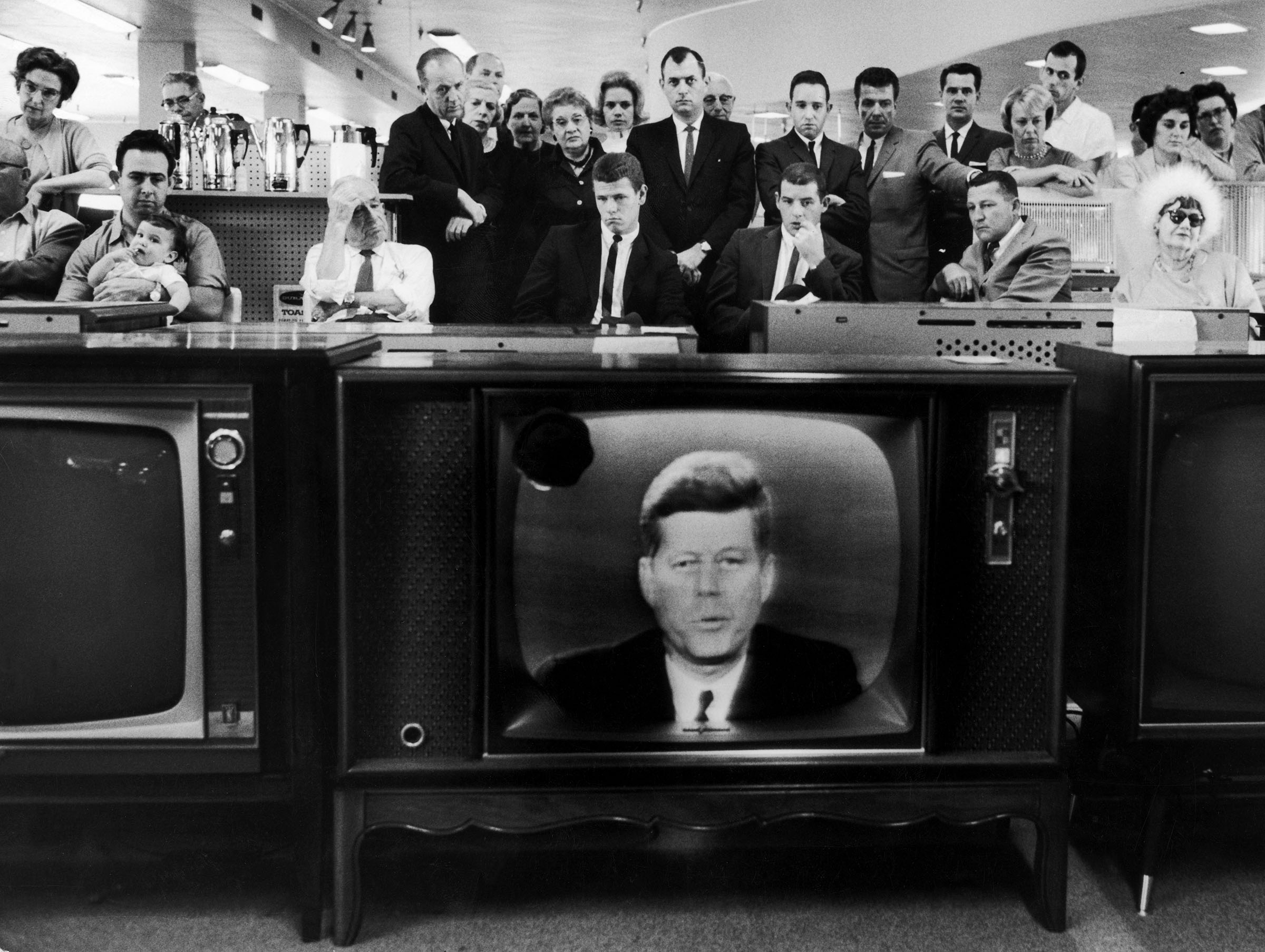
On Tuesday morning, October 16, 1962 President John F. Kennedy awoke to a political and security nightmare. At 9 A.M., McGeorge Bundy, his National Security Adviser, informed him that a U-2 reconnaissance mission over Cuba had photographed Soviet medium range ballistic missiles, nuclear capable weapons with a range of 1,200 miles.
In public and private statements Premier Nikita Khrushchev had stated that he sent only defensive armaments to Cuba, and during a press conference in September the president had warned Khrushchev that the United States would not tolerate offensive weapons. But Bundy’s report made it clear that Khrushchev had deceived him.
Meeting that morning with fourteen handpicked advisers—known to history as the ExComm—Kennedy agreed that the missiles would have to be bombed and Cuba invaded. But a week later, on Monday evening, October 22nd, he announced his decision to “quarantine” (blockade) Cuba as the first move to force Khrushchev to withdraw his missiles.
It was a tortured decision. It required shedding firmly held Cold War doctrines and resisting the arguments of hard-line advisers who favored attacking Cuba and overthrowing Castro. It was a political risk, but in light of the possibility that an attack could lead to a war with the Soviet Union, Kennedy reasoned, possibilities had to be treated as probabilities. How he reached this conclusion is revealed in a secret recording of a meeting with the Joint Chiefs of Staff [JCS] on the fourth morning of the crisis. It offers a cardinal lesson in presidential leadership in the nuclear age.
“The Joint Chiefs of Staff saw Fidel Castro’s regime as a cancer that must be removed, by whatever means proved necessary,” according to Walter Poole, the official historian of the JCS. “They came to that conclusion in March 1960 and conveyed it repeatedly thereafter to their civilian superiors.” They insisted that a Communist Cuba threatened the security of the Western Hemisphere, and they assured the commander in chief that it was possible to depose Castro “without precipitating a general war, and without serious effect on world opinion.”
The meeting in the Oval Office on October 19th began at 10 a.m. with JCS chairman, Gen. Maxwell Taylor, explaining that the chiefs unanimously agreed on a minimum of three steps: a surprise [bombing] attack against the known missile sites, continued surveillance, and a blockade to prevent reinforcements from entering Cuba.
“Let me just say a little, first, about what the problem is, from my point of view,” President Kennedy interrupted. Returning to a question he had asked during the initial ExComm meeting, he proposed that “we ought to think of why the Russians did this.”
It provided them with a range of new options, he explained. “If we allow their missiles to remain, they have offended our prestige, and are in a position to pressure us. On the other hand, if we attack the missiles or invade Cuba it gives them a clear line to take [West] Berlin,” Khrushchev’s highest priority since 1958. That “leaves me only one alternative, which is to fire nuclear weapons—which is a hell of an alternative.”
To complicate the situation further, he continued, “our blockade of Cuba will give Khrushchev an excuse to blockade [West] Berlin, which will infuriate our allies. We will be blamed for jeopardizing the city because we overreacted. . . When we recognize the importance of Berlin to Europe, and recognize the importance of our allies to us, that’s what has made this thing be a dilemma for three days. Otherwise, our answer would be quite easy.”
Of course “we’ve got to do something,” he conceded, because doing nothing will not make the Berlin problem go away.
“We recognize all these things, Mr. President,” General Taylor responded, and presented the basic assumption that shaped the Chiefs’ recommendations: Cuba is the test of U.S. resolve. “If we don’t respond here in Cuba we think the credibility of our response in Berlin is endangered,” Taylor declared. “We don’t have any choice except direct military action,” Air Force Chief of Staff Gen. Curtis LeMay added. The blockade, he worried, will provide the Soviets with time to hide their missiles, and it will even encourage them to move against Berlin.
“But what about the Soviet reaction to an attack on Cuba?” the president asked.
They will not respond, LeMay assured him. We just have to be clear that “if they make a move we’re going to fight.” And then he added: “This blockade and political action, I see leading into war. I don’t see any other solution for it. It will lead right into war. This is almost as bad as the appeasement at Munich” (which, it was well known, had been supported by the president’s father, Joseph Kennedy, when he was American ambassador to Great Britain).
It is a loss to history that there is no photograph of Kennedy’s face at that moment. But one can imagine his jaw tightening, his temples pulsing, and his eyes fixed firmly on LeMay.
Chief of Naval Operations, Admiral George Anderson, Army Chief of Staff Earle Wheeler and Marine Corp Commandant David Shoup backed LeMay. As long as Castro was supported by the Soviet Union, a military assault was the only good option, they believed. It was impossible to be sure that all the missiles were destroyed, Gen. Wheeler asserted “until and unless we actually occupy the island.” From a military point of view, he concluded, “I feel that the lowest risk course of action is the full gamut of military action by us. That’s it, sir.”
“Thank you, General,” Kennedy tellingly responded.
Gen. LeMay then reminded the president that he had made several strong public statements warning the Soviets against sending offensive weapons of any type to Cuba. “I think that a blockade and political talk would be considered by a lot of our friends and neutrals as being a pretty weak response to this. And I’m sure a lot of our own citizens would feel that way, too. In other words,” LeMay declared, “you’re in a pretty bad fix at the present time.”
“What did you say?” Kennedy snapped.
“You’re in a pretty bad fix,” LeMay repeated.
“You’re in there with me,” the president shot back. And to be certain that LeMay got his point, he added: “Personally!”
Despite their mutual interest in deposing Fidel Castro’s communist government, the chiefs’ and the president viewed the crisis differently. The chiefs’ objective was to be in the best position to fight a war, while the president’s aim was to select the strategy that was least likely to start a war. The chiefs assumed that a prompt military response (bombing and invasion) would coerce the Soviets, but the president believed it would provoke them to respond in kind: “They can’t let us . . . take out their missiles, kill a lot of Russians and not do anything.”
Both assumptions were plausible, and perhaps the Soviets would not have responded militarily. Khrushchev did not want a war. But he was driven by obligations and pressures that could force him to retaliate if his missiles were attacked. His decision would depend on too many variables for the president to accept the chiefs’ blithe assumptions.

The president’s more cautious attitude reflected the advice he had first received from his Ambassador to the United Nations, Adlai Stevenson: Focus on diplomacy and make it as easy as possible for Khrushchev to back down.
“The argument for the blockade,” he told the Chiefs, “was that what we want to do is to avoid, if we can, nuclear war by escalation or imbalance. The Soviets increase; we use [force]; they blockade Berlin. They blockade for military purposes. Then we take an initial action.” The additional firepower that the missiles in Cuba added to the Soviet arsenal didn’t add “particularly to our danger,” he insisted. “The real danger is [any] use of nuclear weapons.”
The missiles in Cuba might add to the danger, but they didn’t create it, he insisted. The Soviet Union’s ICBMs, bombers, and submarines can kill eighty to one hundred million Americans. “You’re talking about the destruction of a country,” he said. Taking everything into account, “the logical argument is that we don’t really have to invade Cuba. . . . [It’s] just one of the difficulties that we live with in life, like we live with the Soviet Union and China.”
The major argument for forcing the removal of the missiles from Cuba “is the political effect [they will have] on United States [prestige].” An invasion may be the most thorough solution, but “a lot of people [will] . . . move away from us. . . . So that we’ve got a real problem in maintaining the alliance.”
“Am I clear,” General Wheeler asked, “that you are addressing yourself as to whether anything at all should be done?”
“That’s right,” Kennedy responded.
“But that if military action is to be taken,” Wheeler pressed, “you agree with us.”
“Yeah,” Kennedy responded, sounding more like a parent exhausted from a debate with his teenagers than a president discussing strategy with his military commanders.
“These brass hats have one great advantage in their favor,” President Kennedy sardonically remarked to his aide Dave Powers: “If we listen to them and do what they want us to do, none of us will be alive later to tell them that they were wrong.”
And they were wrong. Had the president not insisted on a blockade, had he accepted the Chief’s recommendations (also favored by the majority of his ExComm advisers, he unwittingly would have precipitated a nuclear war. As American troops assaulted the island they would have confronted four times the 10,000 Soviet troops the CIA estimated in Cuba, and they would have been massacred by an array of Soviet tactical nuclear weapons that American intelligence had not discovered.
The decision to blockade rather than invade Cuba led to the most dangerous week of the Cold War. But with diplomacy and luck, compromise and serendipity, the crisis ended peacefully when Khrushchev agreed to withdraw the missiles on Sunday morning, October 28.
No other event in history offers as many relevant lessons about presidential leadership in the nuclear age as those thirteen days in October.
Adapted from Martin J. Sherwin’s new book Gambling with Armageddon: Nuclear Roulette from Hiroshima to the Cuban Missile Crisis. Published by Knopf.
More Must-Reads from TIME
- Cybersecurity Experts Are Sounding the Alarm on DOGE
- Meet the 2025 Women of the Year
- The Harsh Truth About Disability Inclusion
- Why Do More Young Adults Have Cancer?
- Colman Domingo Leads With Radical Love
- How to Get Better at Doing Things Alone
- Michelle Zauner Stares Down the Darkness
Contact us at letters@time.com